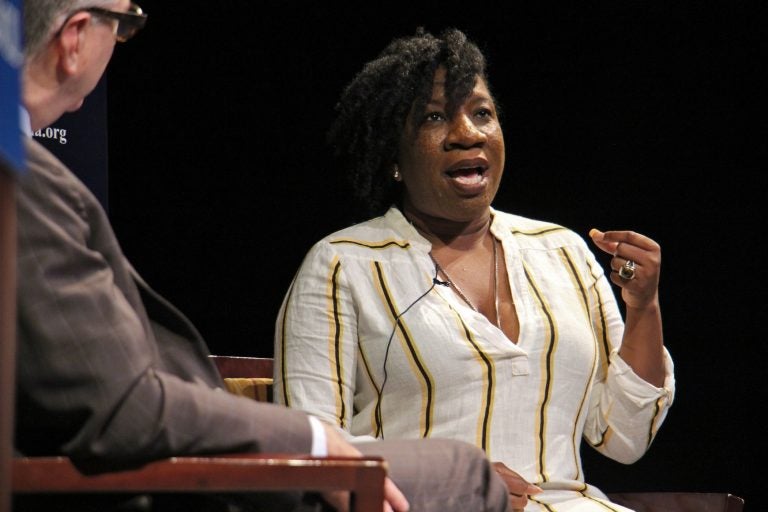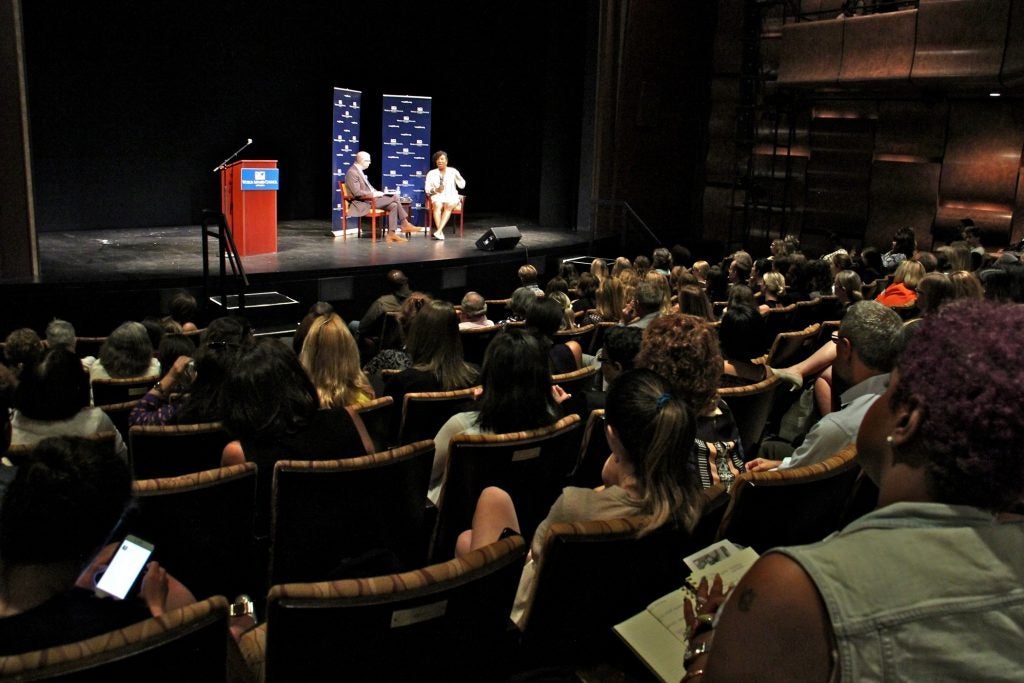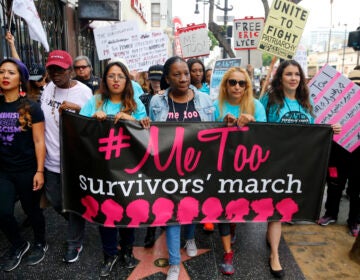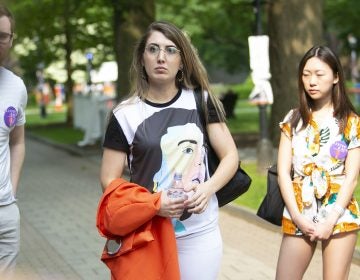In Philly, #MeToo founder says next step for the movement is ‘harm reduction’
Tarana Burke sat for a discussion at the Suzanne Roberts Theatre in Center City hosted by The World Affairs Council of Philadelphia Tuesday night.

Tarana Burke, founder of the #MeToo movement, tells her story during an event put on by the World Affairs Council of Philadelphia at the Suzanne Roberts Theatre. (Emma Lee/WHYY)
A few hours after the release of a damning grand jury report detailing the alleged sexual abuse of more than 1,000 children by 301 Pennsylvania priests, the founder of the #MeToo movement took the stage in Philadelphia.
Tarana Burke sat for a discussion at the Suzanne Roberts Theatre in Center City hosted by The World Affairs Council of Philadelphia Tuesday night. Before a large audience of mostly women, the former Philadelphia resident and activist talked about the true purpose and future of the movement against sexual harassment and violence she launched 11 years ago.
“One of the worst things to happen, in terms of the narrative being turned on its head, is that we have made this a conversation about sex and sexuality and gender,” said Burke. “When, at every turn, it’s about power and privilege.”
Burke began using the phrase “me too” to help survivors of sexual trauma give voice to their experiences.
Since going viral last fall following the uproar over Hollywood producer Harvey Weinstein’s serial sexual abuse scandal, people all over the world have rallied behind #MeToo to demand a safer culture.
Dozens of celebrities, politicians, and business executives have faced accusations of various sexual violations against both women and men.
But like other social campaigns before it — such as #BlackLivesMatter — its original intent has been misunderstood, Burke said.
Critics see the movement as a hindrance to male-female relations. Some have likened it to a witch hunt for men.
One study from the Pew Research Center found that 51 percent of adults out of 6,251 surveyed said increased focus on sexual harassment at the job has complicated interactions with women in the workforce.
Early on, Burke insisted the #MeToo movement is not about targeting men or “naming and shaming” them.

She acknowledged that there have been false accusations and gross generalizations made about some people, but she chalked it up to sexual violence being an emotional issue. The release occurring now will “level off,” she said.
Some of the accusations associated with #MeToo — such as those against actor Aziz Ansari earlier this year — Burke said were missed opportunities for dialogue on topics such as consent, communication, and language.
Ansari was accused of sexual misconduct in a piece on the website Babe.net, in which the author recounts the experience of a woman identified as Grace who said Ansari pressured her for intercourse after a date in 2017. According to the piece, the two did not have intercourse and Grace eventually left Ansari’s apartment. The viral article stirred controversy among critics who argued the encounter did not constitute sexual assault and those who said it reflected a common experience for many women.
“I want us to expand beyond guilt and innocence,” Burke said Tuesday night. “We need to talk about harm and harm reduction because a lot of these things are in a gray area … We need to have the ability to have nuanced conversations.”
Burke also said she is in the early stages of raising $25 million over the next five years. In addition to supporting her work, the money will be used to provide grants to organizations working with victims of sexual trauma.
She said the first round of grants, totaling $500,000, will be distributed in October.
“I also don’t want the #MeToo movement to take up all the oxygen in the room,” Burke said. “I want all the ideas. I want all the people. I want as many people at the table thinking about this issue and trying to figure out how to solve this issue as possible.”
Burke also discussed the importance of education in combating sexual violence and seeing beyond gender.
Zemi Moore, a marriage and family therapist, said the discussion was extremely helpful “because a lot of kids have sexual trauma.”
Moore also praised Burke for including men in the movement, because sexual trauma among men is often overlooked.
WHYY is your source for fact-based, in-depth journalism and information. As a nonprofit organization, we rely on financial support from readers like you. Please give today.





